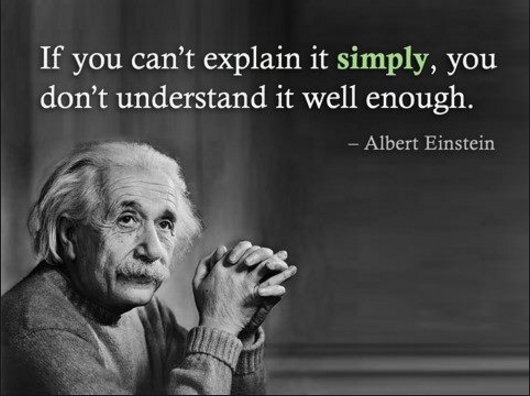An uncomplicated approach to tennis matches is easier to manage
This week a guest was on our site for a week, and they described me, and the way that I work, this week as "uncomplicated". Without expressly setting myself up as being uncomplicated, I am thrilled that I have been described in this way. In particular this suggests that people can assess me quickly, that they see no specific dangers, that they understand what they see, and have confidence in it.

Uncomplicated = logical, workable, ideas
There are a few people that I can see in my sphere who definitely belong in the uncomplicated category. But before we look at that, what is the real problem with being complicated.
In these pages we've looked at the difficulties of being seen as a "baby". These are people who are constantly in need of reassurance from their immediate environment. They are profoundly insecure in themselves, even though they may visibly exude immense talent. When they feel truly insecure, when things are going wrong, and are under pressure, these people are quick to blame their entourage for this insecurity. It is everybody else's fault but thier own. How do you get someone like this to understand that life is hard? We are confronted regularly with big and small tests that we don't necessarily have the required experience to deal with. The new experience in front of us will seem daunting, and scary. Maybe we'd far rather be doing something else, something that we know well, where we are fairly sure nothing can go wrong. However, we have no choice, we must confront this new challenge. Naturally, instead of being scared, we should be excited at the prospect of learning new things, of being able to extend our skills in dealing with the unknown.
This is where it helps to be uncomplicated. The uncomplicated person wakes up every morning. He has his routine. He has his daily tasks. A surprise falls into his lap. He treats every problem as an opportunity to find a solutions, or a range of sultions that he is ready to test. He may put himself in danger. He may risk exposing his lack of competence. He may risk losing his hard-gained reputation, but he should treat every new situation as if he had nothing to lose. He is effectively starting from zero.

A person who starts every new day from zero is the most uncomplicated. Effectively everything that is in the past can certainly influence his actions and decision-making, but more probably he is ready to take a step into the unknown, to take every new scenario as if he had never seen it before.
And in fact life is like that. Even though you look at a situation and you think you've never seen it before, it's not true. There are many situations that resemble others, but there'll always be a detail that makes it differ from anything that happened before. So the uncomplicated person will accept that, and use his bank of experience more as a back-up, not really as something that gives him a standard format of how to react, and how to behave. He has a fresh look. He may even look on every detail as new, since he knows that that one detail that is so very different, effectively affects even those details that look very familiar.
Uncomplicated coaching
In the world of tennis, a player will have had a hard rigorous, often very fixed learning process. He'll have learned to learn from his coaches. His training will have instilled in him physical movements that will serve him well in match situations. An opponent sends you flying into an angle with a forehand crosscourt, and your training will cause you to return the ball as if your body and mind were not in the slightest stress. For many players it's a very hard ball to return, but for the seasoned pro, this is a ball he'll return comfortably 99 times out of 100.
So what happens if this same ball arrives from the opponent with varying speeds, spins and angles? Has my fixed learning trained me to deal with a situation that I haven't necessarily trained myself sufficiently for? The complicated person will search for excuses.He'll blame his body, blame his mind, blame his coaches, his schedule and his racket. All sorts of possibilities will emerge, because the complicated person's mind works like that.
The uncomplicated person will indeed feel the stress. But he'll see the challenge positively. He'll know he may have to go to a place that he hasn't really been before. But he'll trust himself to give some sort of response. His response won't be far wrong, but it may fail.

A top tennis player is supposed to be a clever tactician. He is supposed to be watching the moves that his opponent makes, and trade it off against those that he himself is making. So much of the game is played in the mind. It's not just about forehands and backhands.
"Eek! Every time I give him a slow ball on the forehand he crashes it into my forehand corner." Decision - I must stop hitting to his forehand. Wrong. The uncomplicated person, he knows that forehand crosscourts of all types belong in the big picture of the game. It simply cannot be avoided.
So now the uncomplicated person makes the right decision. He says, OK, I'll hit those slow balls onto his forehand, but when he smashes it crosscourt, I'll be ready for it. I'll be waiting for it. And once I pick them up, I'm going to come back at you with my own weapons.
The plan could go wrong. He could indeed be hammered off the court by these big forehand crosscourts. But the uncomplicated person accepts the general parameters of the game, of life in fact, and takes on the challenge, knowing that even if it doesn't work out today, it'll give him useful experience later in his match-playing life, and give his coach ideas for practice.
Have A Great Story About This Topic?
Do you have a great story about this? Share it!
Five of our most popular pages
. tournament win
. finding a sponsor
. the touring pro
. the master at work
